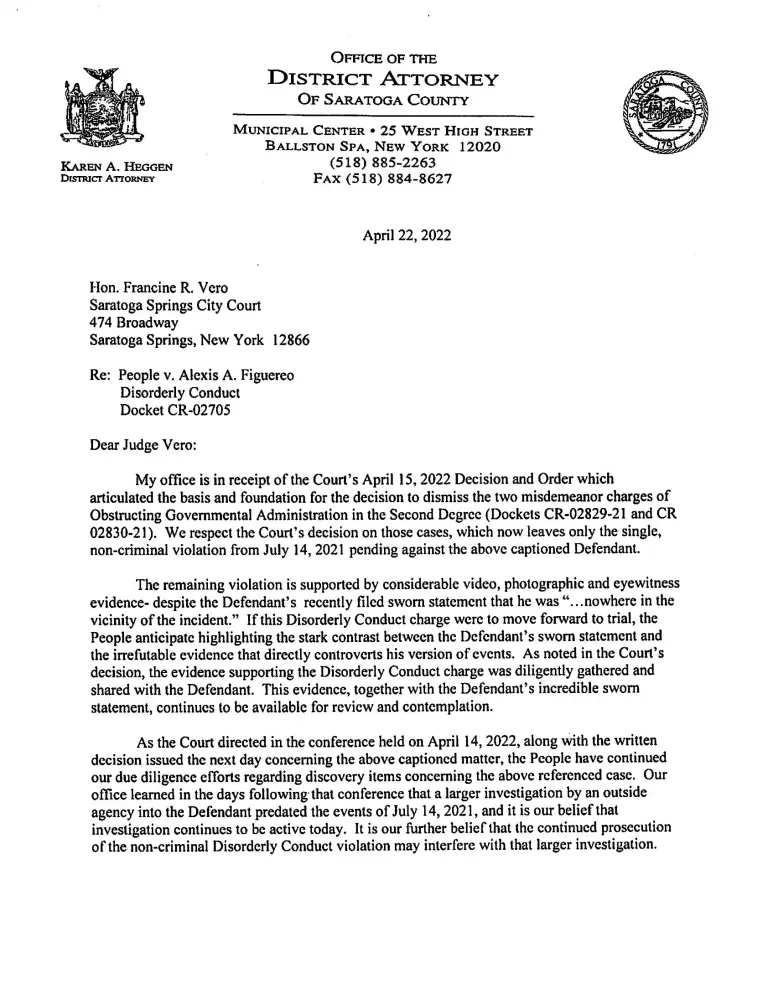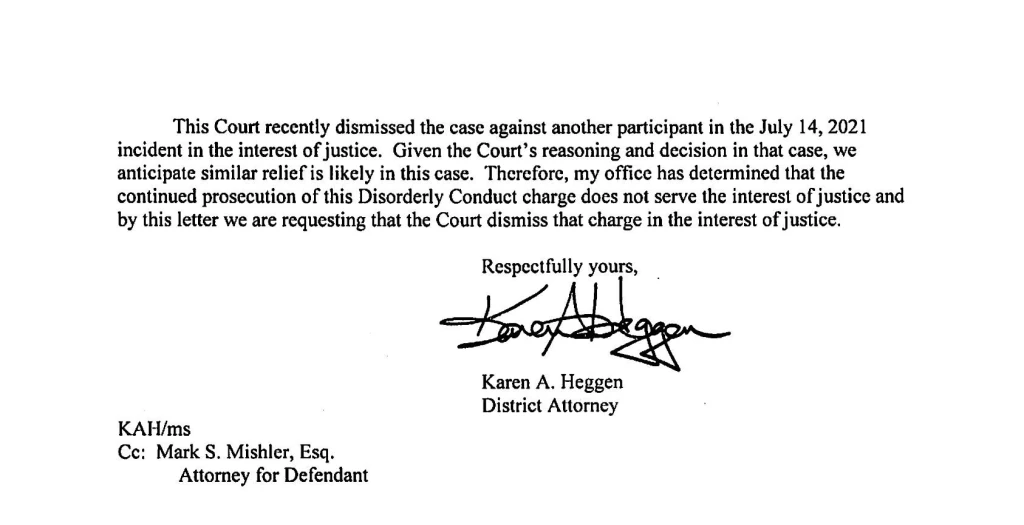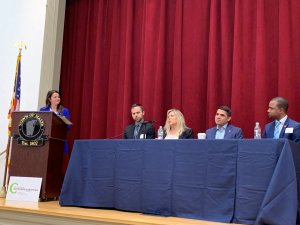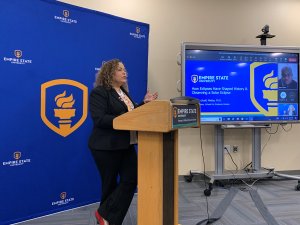
Last fall Black Lives Matter member Lexis Figuereo was arrested and charged with two misdemeanors and a violation. While all charges were either dismissed or dropped this spring, controversy over the nature of the charges and how they were resolved remains.
This post explores these controversies in two sections. The first section focuses on some of the issues raised by the charges against Lexis Figuereo. The second is an in-depth review of Judge Francine Vero’s decision to dismiss charges in the case. The discussion of the decision is lengthy but worth the time to read. It will hopefully shed some light on the complexity of what is required to determine guilt or innocence that often leads to the dismissals of charges in cases like this.
Part 1: The Charges
Black Lives Matter member Lexis Figuereo was arrested last September and charged with two misdemeanors for obstructing governmental administration arising from incidents at the July 6 and July 20, 2021, Saratoga Springs City Council meetings. He was also charged with disorderly conduct, a violation, for allegedly blocking traffic during a July 14, 2021, demonstration in downtown Saratoga Springs.
Here are two video segments of the July 20, 2021, City Council meeting showing some of the events of that evening that led to one of the misdemeanor charges.
This video clip shows Mayor Kelly attempting to bring order during the public comment period of the meeting that night.
{youtube}https://www.youtube.com/watch?v=3HZYObhFaVw{/youtube}
This is a video clip of the chaos the meeting descended into as the Mayor attempted to conduct City Council business.
{youtube}https://www.youtube.com/watch?v=bMXbCs53oCU{/youtube}
To Figuereo his behavior at the City Council meeting was an exercise of his Constitutional right to free speech. His lawyer Mark Mishler claimed that Figuereo had been “speaking out for justice” and that the charges of obstructing governmental administration were “bogus from the beginning and were only…pursued as a way to try to silence Lexis and to scare other activists from engaging in legitimate and constitutionally protected activism.”
This perspective on the charges was shared by Saratoga Springs Mayor Ron Kim and Finance Commissioner Minita Sanghvi. They appeared at a press conference prior to Figuero’s hearing and called for dismissal of the charges against Figuereo. They sharply criticized Saratoga County District Attorney Karen Heggen and Saratoga City Court Judge Francine Vero. Ron Kim told the Daily Gazette:
“We’re talking about a First Amendment right to protest. We’re not talking about somebody burglarizing a car,” Kim said. “Why are we even wasting taxpayer money dealing with this seems to be insanity. It is not cost free to have all the appearances and all the rest of this stuff. I don’t know why the district attorney did not dismiss this or the judge, a long time ago.”
Daily Gazette April 15, 2022
My observation of our police is that they have no problem with people exercising their rights to speech and to assembly by marching on the sidewalks. Likewise, the police are willing to coordinate with Mr. Figuereo and other groups for a march that would occur on the city’s streets. The problems have occurred when BLM refuses to give the police any information on when and where they plan to demonstrate and then block traffic putting themselves and others in danger.
As Mr. Kim, who is a lawyer, is well aware, no right is absolute. Slander, for instance, is not protected speech. Judge Vero addressed this issue when she ruled that there was enough evidence to allow the charge against Figuereo for disorderly conduct arising from the obstruction of traffic in a July 14 BLM demonstration to proceed. She quoted from two relevant precedents:
[t]he authority of a municipality to impose regulations in order to assure the safety and convenience of the people in the use of public highways has never been regarded as inconsistent with civil liberties but rather as one of the means of safeguarding the good order upon which they ultimately depend. The control of travel on the streets of cities is the most familiar illustration of this recognition of social need.
Cox v State of New Hampshire
A state may prohibit someone from “taking his stand in the middle of a crowded street, contrary to traffic regulations and maintain[ing] his position to the stoppage of all traffic….since such activity bears no necessary relationship” to freedom of speech (Schneider v State of New Jersey). To that end, “[w]hen conduct, even taking the form of protest, substantially interferes with vehicular or pedestrian traffic, prosecutions for disorderly conduct are appropriate and constitutional.”
Judge Vero
Similarly, Figuereo certainly had the right to address the Council like any other citizen during the public comment period but not to shout at the Council in a way that made it impossible for them to carry out city business.
I wonder how Kim and Sanghvi would react if it had been white supremacists interrupting City Council meetings.
In the end, the two misdemeanor charges were dismissed by City Court Judge Francine Vero, and Saratoga County District Attorney Karen Heggen dropped the remaining violation charge, but none of these decisions had anything to do with the free speech and assembly issues Figuereo and his supporters focused on in the press.
Judge Vero Dismisses Two Charges Due to Inadequate Documents
On April 15 Saratoga Springs City Court Judge Francine Vero dismissed on technical grounds the two misdemeanor charges that alleged Lexis Figuereo “Obstructed Governmental Administration” (OGA) by disrupting two City Council meetings.
The prosecution is required to meet a variety of essential requirements in order to successfully achieve a guilty verdict in cases involving OGA charges. Vero’s decision focused on the inadequacy of the paperwork provided to the court by the District Attorney (a fuller discussion can be found later in this post). As the charges were dismissed “without prejudice”, however, the DA had the opportunity to either correct the flaws cited by Judge Vero and resubmit them or to bring different charges related to the disruption of the City Council meeting that might better satisfy the Judge. Instead, the prosecution chose not to pursue either of these options for reasons that only later became evident.
In the case of the disorderly conduct charge related to blocking traffic, Judge Vero was prepared for the parties to go to trial. It is important to note that Figuereo’s attorney, Mark Mishler, contended that his client was not present at the event. The prosecution’s paperwork apparently presented sufficient evidence to the court documenting Figuereo’s activities that day (I assume body cam and other videos) that contradicted Mishler’s assertion that Judge Vero decided a trial was in order.
Surveillance, Discovery, and the Collapse of The Prosecution
On April 22, Saratoga County District Attorney Karen Heggen released a statement requesting that the court dismiss the remaining violation charge against Figuereo. She gave two unusual and surprising reasons for her actions.
One of the two reasons she gave for withdrawing the last charge against Figuereo was somewhat of a critical swipe at Judge Vero. Vero had previously dismissed similar charges against Jamaica Miles “in the interest of justice.” Heggen asserted that because of Vero’s actions in the Miles case, there was no point in pursuing the charges against Figuereo because, DA Heggen contended, Judge Vero would do the same again. Given the differences between Miles who had no previous criminal convictions and is a single mother of three versus Figuereo who has a record of previous convictions it is not obvious to me that this was a fair conclusion on Heggen’s part. It does not seem to me to be a compelling reason to drop the charges.
The second reason DA Heggen cited was the existence of an ongoing investigation by an outside, unnamed organization that predated the July 14 events that lead to Lexis’ arrest. She claimed that pursuit of the disorderly conduct charge would interfere with that investigation.
When Lexis Figuereo was arrested, the police seized his cell phone. Mr. Figuereo sought for months to get it back and when it was finally returned to him it was in an FBI evidence bag. So I think it is reasonable to assume that the mystery agency is the FBI.
The case against Figuereo collapsed because the involvement of the FBI was not disclosed to the defense. DA Heggen was unwilling to pursue with the FBI whatever evidence they might have gathered in order to comply with the discovery requirements. Her refusal to do this meant the case could not go forward.
A Troubling and Inconclusive “Resolution”
Lexis Figuereo has managed to take a laudable call for social justice and reduce it to a series of nuisance events that have alienated many who would share his goals. Having observed him and the people who follow him, they appear to believe that disrupting the deliberations of the Saratoga Springs City Council by yelling epithets and shouting abuse will somehow build a social movement.
Mr. Figuereo is undoubtedly annoying but for me, he does not rise to the status of being a serious threat meriting an FBI investigation. If, in fact, the Federal Bureau of Investigation is investing serious resources to investigate him, it is a sign of how wasteful our intelligence agencies can be. More likely, he is probably peripheral to something else they are investigating. What is frustrating is that their investigation has interfered with a thorough judicial review of Figuereo’s actions here in the city.
The challenge for Saratoga Springs and its police is how to manage Mr. Figuereo and his group while protecting their civil rights but also avoiding injuries to demonstrators, the public, and the police and the disruption of council meetings so that city business can be transacted.
As demonstrated by the results of Figuereo’s court cases, finding a solution will not be easy.
DA Heggen’s Letter to Judge Vero


Part 2: Judge Vero’s Decision–Into the Weeds
https://saratogaspringspolitics.files.wordpress.com/2022/04/vero-decision.pdf
I have spoken to a number of lawyers who felt that Judge Vero wrote an unusually long, thoughtful, and thoroughly researched decision, especially for a misdemeanor charge in a local municipal court.
In a twenty-three-page decision issued on Friday, April 15, 2022, City Court Judge Francine Vero dismissed two of the three charges against Lexis Figuereo. The charges were dismissed for technical reasons.
This is a very long section because Judge Vero’s decision involves a great many issues and many of these are still unresolved.
I urge readers to take the time to go through this part of the post because it is instructive as to how much more complicated the issues of guilt and innocence are than most people realize.
A casual observer, like me, of the events of July 20, 2021, may come away from viewing the video believing that it seems obvious that Mr. Figuereo participated in an action that made it impossible for the City Council to transact their duties and that therefore he is guilty of “obstructing government administration.”
Judge Vero’s opinion documents that the issues are far more complex.
Mark Mishler, the attorney representing Lexis Figuereo, is a talented and experienced criminal defense attorney. His rigorous challenges to the charges expose just how difficult rendering guilt and innocence is.
“Facially Insufficient”
Judge Vero dismissed the charges of obstructing government administration (interfering with the city council’s deliberations) citing that the complaint submitted to the court was “Facially Insufficient.”
This is a link to an article that provides some explanation for this term.
In order for a misdemeanor information (complaint) to be facially sufficient the misdemeanor information must, when viewed in a light most favorable to the People (the District Attorney or prosecution), contain non-hearsay factual allegations providing reasonable cause to believe that the defendant committed the offense(s) charged; and which establish, if true, every element of the offense(s) charged. [my emphasis]
Crotty | Saland
As Judge Vero states in her decision:
Every information (jk: complaint) must contain an accusatory part (jk: what the person is being charged with) and a factual part, and the factual part of such instrument must contain a statement of the complainant alleging facts of an evidentiary character supporting or tending to support the charges.
Judge Vero
“Evidentiary” here means facts that are consistent with the standards of the court. “Hearsay” is not evidentiary. A statement by a police officer that he heard that person X did Y would be considered hearsay.
A statement by a witness that personally saw X do Y would be evidentiary as would be physical evidence like a weapon.
Basically, in their information/complaint, the prosecution must lay out what it believes the facts to be that they hope to prove at trial.
This is especially important as it provides the defense with the required information for them to prepare their case.
So for example the charge might be shoplifting. The complaint/information must include “facts of an evidentiary nature” such as affidavits from persons who saw the theft describing what they saw. It would include a description of the item that the person was trying to steal.
In her decision, Judge Vero observed that the complaint was based on statements made by a police officer on “investigation, photographs, and video alleging the incident.” The key issue here is that the officer offering support for the charges was not present at the actual events. Vero notes that “To date, the People (prosecution) have failed to file a supporting deposition sworn to by the mayor or anyone present at the meetings.” She notes that the July 20 events had at least an incident report in which a police officer describes what he observed and heard on a video. Judge Vero writes, “With respect to the July 6th alleged incident, there is no police report, supporting deposition, or other document attached to or accompanying the information.”
So the defense argues that the complaint is simply based on hearsay evidence or “conclusory” assertions. In this case, a conclusory assertion would be that “Figuereo obstructed the meeting.” Stating that it happened is not the same as documenting the specifics meant to prove what happened.
The prosecution disagreed with the judge regarding her claim of lack of evidence. They cited a precedent that “…an affiant (a person who swears to an affidavit) officer’s statement of what he or she views or hears on a videotape is not hearsay.” Such a precedent might have provided a strong basis for appeal.
Judge Vero notes that “Even if the Court were to consider the allegation in the July 20th Incident Report as non-hearsay, the Report has not been verified by any of the methods set forth in… [she cites a series of precedents] and based upon the Report narrative it is not clear whether the officer is relying on a review of a transcript in addition to video footage to form the basis of the allegations.” Apparently, the complaint did not make clear what sources the officer used in determining the charge.
So basically, Judge Vero dismissed the “Obstruction” charges because the information/complaint was fatally flawed because it lacked clear facts supported by affidavits made by persons present at the incidents.
Prosecution Has Not Proven Obstruction of Government Administration
Judge Vero asserts that putting aside the “deficiencies,” the prosecution has still failed to address the required basis for the charge of the Obstruction of Government Administration.
She writes:
“The statute requires as an element of the crime that the accused act by one of three methods: (1) intimidation, (2) physical force or interference, or (3) any independently unlawful act.”
Judge Vero
She cites a Court of Appeals precedent “…that purely verbal interference may not satisfy the ‘physical’ component under penal law.” “[M]ere words alone do not constitute ‘physical force or interference,’ [and] in order to trigger criminal liability under section 195.05, the interference would have to be, in part at least, physical in nature.”
I expect that this is because this charge is more commonly used when someone attempts to interfere with a police officer trying to carry out a duty like arresting someone. In that case, people yelling at an officer trying to make an arrest would not constitute obstruction.
Physical threat
Judge Vero wrote that in this case:
The only allegations regarding the Defandant’s conduct are that he “yell[ed] over,” “continue[d] to talk over,” “continued to yell,” “sp[oke] over,” and continually interrupted” the Mayor and Council members–That is it. This is purely verbal interference and does not satisfy the physical requirement of Penal Law 195.05.
Judge Vero
Intimidation
Judge Vero wrote:
Intimidation in the context of the statute means intimidation by threat of physical force or interference. There is no allegation as to what the Defendant was yelling or that it put the Mayor in fear or deterred her by means of a threat.
Judge Vero
Independently Unlawful Act
Judge Vero wrote:
The people (prosecution) submit the Defendant could have been charged with Disorderly Conduct (Penal Law 240.20[4]) and this uncharged offense constitutes the independently unlawful act upon which the Obstructing Government Administration in the Second Degree charge may be grounded. This is a vague, conclusory alternative theory of the alleged act of obstruction that simply does not provide the Defendant with the “requisite ‘notice sufficient'” to defend against the charges.
Judge Vero
The factual part of the Information (complaint), however, does not in any way allege the Defendants conduct constituted another independently unlawful act, to wit, Disorderly Conduct.
Judge Vero
Here, Judge Vero observes that as the prosecution did not include the charge of Disorderly Conduct in their complaint, they cannot utilize this argument now. It’s too late.
Intent
Judge Vero wrote:
The Informations (complaints) also fail to establish the element of intent. The Informations merely allege the Defendant “prevent[ed] the Mayor from performing her official functions. There are no allegations that by yelling he intended to obstruct, impair, pervert, prevent, or attempt to to prevent the Mayor from performing an offical function. Also absent from the Informations (complaints) are any allegations from which the Defendant’s intent or recklessness can be discerned.
Judge Vero
The prosecution did not establish intent as they did not offer any evidence showing that Mr. Figuereo’s actions were consciously done in order to disrupt the proceedings of the council.
The Nub
So the District Attorney’s office could have used Judge Vero’s arguments for dismissing the Obstruction charges to recraft their complaint and resubmit it. They could also have considered whether there are other charges regarding the events at the Council meetings that might better hold up under her scrutiny.
Problems With Discovery
Judge Vero wrote:
Under CPL 245.2 (1) prosecutors are required to disclose “all items and information that relate to the subject matter of the case that are in the possession, custody, or control of the prosecution or persons under the prosecution’s control.”
Judge Vero
The prosecution is required to provide this information to the defense within thirty-five days of the arraignment.
Once the prosecution has fulfilled the discovery requirements…it must serve upon the defendant and file with the court a certificate of compliance (COC). “The certificate of compliance shall state that after excercising due diligence and making reasonable inquiries to ascertain the existence of material and information subject to discovery, the prosecuter has disclosed and made available all known material and information subject to discovery” and “identify the items provided (id).”
Judge Vero
The prosecution, having provided all relevant documents to the defense, must submit a certificate formally declaring that they have met their obligations. So on September 24, 2021, the prosecution filed their COC and Statement of Readiness for Trial.
In early January 2022, the Defense became aware for the first time that undercover law enforcement officers were present at the July 14, 2021 protest…the next day the People (prosecutors) disclosed the names of seven individuals from Saratoga Springs Police Department (SSPD) and Saratoga Sheriff’s Department who were present at the protest in an undercover capacity.
On January 13, 2022, the People (prosecution) disclosed the SSPD’s 30 page Operational Plan for the protest.
The People (prosecution) concede the identities of and information regarding the undercover officers and Operational Plan are discoverable materials that should have been provided in their original discovery package. This evidence is not only undeniably discoverable but also extremely significant for the Defense. The issue before the Court is whether the belated disclosure renders the People’s (prosecution’s) COC invalid.
“[n]o adverse consequence to the prosecution…shall result from the filing of a certificate of compliance in good faith and reasonable circumstances.” “[N]umerous courts have found that belated disclosures should not invalidate a certificate of compliance that was made in good faith after the excercise of due diligence.”
Judge Vero
The fact that the prosecution failed to include some discoverable information does not necessarily invalidate the certificate of compliance so long as the court believes the prosecution had acted in good faith and had not tried to hide items from the defense.
In this case, the only explanation proffered by the People for their failure to timely provide discoverable materials is that the SSPD failed to make them aware of the undercover officers or the Operational Plan.
Judge Vero
Despite the People’s failure to ensure the required flow of information sufficient to avoid the omission of critical evidence, immediately upon realizing the People’s (prosecution’s) discovery as incomplete, the assigned assistant district attorney (ADA) diligently worked with the SSPD to obtain further discovery regarding the protest.
The ADA…expeditiously provided the names of all undercover officers, their impeachment materials and the Operational Plan to the Defense.
Judge Vero
The court finds the People (prosecution) have substantially complied with their discovery obligations. When the discovery lapse came to light the ADA made diligent, good faith efforts to obtain and provide discoverable materials under CPL 245.20(1) to the Defense.
Judge Vero
“…the Court declines to invalidate the People’s (prosecution’s) COC.
Judge Vero
Sanctions
Even though Judge Vero did not invalidate the Certificate of Compliance (COC), this did not mean that she was dismissing the question.
A court may impose remedies and sanctions on the People for belated disclosures even when a certificate of compliance was filed in good faith.
Judge Vero
She directed both parties to submit written submissions addressing possible sanctions.
The Defense has asserted that the prosecution has failed to disclose “communications and statements made by and between the undercover officers present at the July 14, 2021 protest.” These are discoverable but the prosecution claims that it has sought these items but that none exist. Such communications, the prosecution contends, may have been only verbal and no written documents or recordings exist.
Judge Vero wrote that at this time she is taking no action. She does, however, concede that “…its is likely at least some of those communications were written or otherwise recorded.” “…Defendant is granted leave to renew his motion to strike the COC on this ground if it is revealed at the…conference that the People (prosecution) failed to disclose any written or recorded communications between the undercover officers present at the July 14th protest, including Emails or text messages. The Defense may also move for sanctions pursuant to CPL 245.80 on this ground.”
The Defense also contends that the police monitored the defendant dating back to June of 2020 and asserted those records should have been provided. This may tie into the reason the DA dropped the last charge. It may be that those records are related to the larger investigation that is being carried out by the unnamed organization (the FBI).
In their Opposition the People (prosecution) submit they “have continually sought these records as part of their discovery obligations and have represented to [the] Defendant that no such additional records exist. Additionally, the People (prosecution) are continuing to request these records.”
Judge Vero
The parties’ submissions are inadequate to provide the Court with a clear understanding as to where they are with respect to this critical item of discovery. It is unclear whether the People (prosecution) have attempted to locate such information and materials and none exists, or if the People’s (prosecution’s) position is this discovery is overly broad…, or if some materials have been provided since January and the Defense is requesting more.
Judge Vero
Judge Vero writes that there will be a conference with the lawyers on April 26, 2022, to go over the issue of potentially still undisclosed items. If it had turned out that there were, the prosecution would have been directed to obtain them and to file a supplemental certificate of compliance.
The People’s (prosecution’s) failure to disclose may result in striking the COC or imposing sanctions…
Judge Vero
The Defense also argues that they have a right to the disciplinary records of the police officers involved. The prosecution provided some documentation regarding the plainclothes police but has declined to provide documentation for officers whose disciplinary allegations were deemed to be “unsubstantiated” or “unsustained.” The prosecution claims that no such unsubstantiated complaints exist. The prosecution argues that even if unsubstantiated complaints exist the prosecution is not obligated to disclose them.
Judge Vero drew a distinction between unsubstantiated complaints against officers and exonerated and unfounded allegations. She wrote that unsubstantiated complaints are discoverable.
In the end all this became moot when DA Heggen asked the court to dismiss the remaining charge against Figuereo.




































